By Liam Reilly, CNN
Sat July 12, 2025
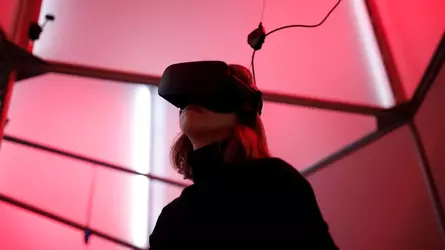
A woman plays a video game with the Oculus Rift VR headset at a video arcade dedicated to virtual reality in Paris, France on December 5, 2016.
Virtual reality was supposed to transform entertainment. At least, that was the expectation roughly a decade ago with the arrival of the Oculus Rift, the first virtual reality (VR) headset that many believed would push VR into the mainstream.
In 2025, the industry has failed to deliver on that promise. But tech and entertainment giants alike believe that moment could be closer than ever.
The evidence is there. The Wall Street Journal reported last month that Meta is in talks with Disney, A24 and other entertainment companies to produce immersive content for its Quest VR headsets. Apple announced an update to its Vision Pro headset in June, enabling users to share content with other headsets — ideal for watching movies together in 3-D. Earlier this year, Apple also launched an immersive Metallica concert for the Vision Pro and announced in July it’s readying its first upgrade to boost the Vision Pro’s performance.
Taken together, this signals that tech and media behemoths are still betting that consumers will be willing to spend hundreds, if not thousands, to experience concerts, movies and sporting events beyond the confines of a traditional screen.
A chicken-and-the-egg paradox
In the 10-plus years since Oculus debuted the Rift, headset manufacturers have produced lighter, more powerful devices. Meanwhile, companies are finally warming to the idea of another medium for storytelling.Tech companies have a history of flirting with VR projects aimed at mainstream users. In June, Meta offered live virtual rinkside tickets to Stanley Cup games, echoing previous NBA and WNBA offerings. Headset owners have attended virtual concerts for years, including Apple’s immersive Alicia Keys session and Meta’s Blackpink show. Disney even launched a Disney+ app for Apple’s Vision Pro on Day 1 in 2024.
But these have been pilots to gauge interest, not long-term investments. Historically, headsets have been trapped in a chicken-and-egg paradox: to woo entertainment content, they need mass adoption; but to reach that scale, headsets need premium content.
The technology must also be comfortable, powerful and popular enough to gain mass appeal. For Sarah Malkin, director of entertainment content for Meta’s VR division Reality Labs, that cycle is already being broken.
“I think the ‘it moment’ is when you are regularly engaging in experiences in mixed reality that are super complementary and part of your integrated life,” Malkin told CNN. “To me, that’s already happening.”
Global shipments of augmented reality (AR) and VR headsets increased by around 10% in 2024 to 7.5 million and nearly 30.8% to 3.4 million in the US, according to IDC, a global market intelligence and data company. Although IDC predicts shipments around the world will tumble this year due to delayed product launches, it expects a massive rebound in 2026 with worldwide shipments surging 98.5% to 11.3 million.
However, the results haven’t always lived up to the hype. Mark Zuckerberg’s Metaverse has cost Meta $46 billion over three years. Reality Labs, the company’s VR division, posted $4.2 billion in operating loss and just $412 million in sales in Q1, down from the previous quarter.
But tech giants continue to experiment with the technology. Meta invested $3.5 billion in eyewear manufacturer EssilorLuxottica SA to bolster its AI spectacle gambit, according to Bloomberg. (A Meta spokesperson declined to comment on the report.) Snap recently said it plans to launch new augmented reality spectacles next year, and Google continues to work with partners like Xreal and Samsung on upcoming headsets and glasses that run on its new Android XR software. Samsung will be among the first to launch such a device with its upcoming Project Moohan headset.
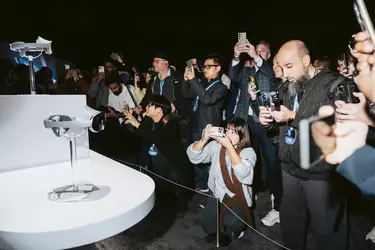
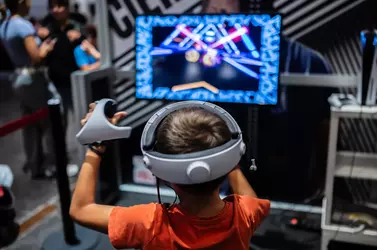
Left: Attendees photograph Samsung's Project Moohan mixed-reality headsets with Google at the Galaxy Unpacked event in San Jose, California, on January 22, 2025.
Right: A young boy plays with Meta Quest 2 all-in-one VR headset during a festival of video games and other digital entertainment in Zaragoza, Spain, on October 15, 2023.
With more sophisticated hardware and a budding content portfolio, Bertrand Nepveu, a former Vision Pro contributor and partner at Triptyq Capital, said wider adoption is crucial.
“It’s still early, but there’s no technical limitation right now, it’s more (that) we need people to invest because you need a critical mass,” Nepveu told CNN.
A paradigm shift in content
Although big names like James Cameron and Sabrina Carpenter are already beginning to explore VR, immersive storytelling has yet to gain that crucial widespread popularity. Slow growth can be partially attributed to incorrect assumptions by studios.“You can’t just take the flat version of what you put on Disney+ or Netflix or Amazon, and just throw that up,” Jenna Seiden, an industry consultant and adviser who has worked with Skydance Media, Niantic, CAA, and Xbox, told CNN. “You need to build natively so the audience is going to have a different experience per platform.”
While creating media for virtual and mixed reality may seem like a departure from developing content for 2-D screens, Seiden says the secret to success is a tactic media companies are already familiar with: exclusivity.
“You look at the creation of HBO (Max), you look at the creation of Apple TV+, they grew their audiences based on exclusives, that’s why you went to them,” Seiden said. “I think that model is very familiar to entertainment companies, and they can go to their board saying, ‘Hey, this is how platforms grow, with exclusive content.’”
That’s what makes live virtual sports an easy way to break down extended reality (XR) barriers for audiences. Paul Raphaël, co-founder of Felix & Paul, said sports can be easily adapted for immersive platforms using 180-degree cameras.
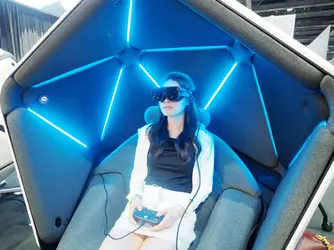
Audiences experience VR e-sports games at the 2025 Jingxi E-sports Festival in Beijing, China on June 28, 2025.
“You already have quite a few events and sports being broadcast, whether it’s live or asynchronous,” Raphaël said. “As the audience grows, it’s a really straightforward path to create the content or to broadcast the content.”
For Hollywood, the possibility of a new major distribution platform couldn’t come at a better time.
In today’s fracturing media environment — shaken by streaming, the collapse of the cable bundle, and post-Covid box office woes — a new medium could be a crucial selling point, especially for entertainment boards looking for a new revenue vein. Jack Davis, co-founder of CryptTV, said headsets might provide a much-needed pipeline for premium content.
“As gigantic structural changes happen in TV and film, the industry is going to need to replace those things in the aggregate,” Davis said. “This could be one of the only formats that premium entertainment actually seems like it makes sense (for) the user base.”
Budgetary and content hurdles
Over the past decade, investment in VR has been eclipsed by more pressing innovations, including self-driving cars and AI.Although it’s difficult to determine how that has directly impacted XR investment, funding data from Crunchbase, a predictive company intelligence solution, shows that backing for AI and self-driving has steadily increased, rising from $39.96 billion in 2019 to $105.36 billion by 2025. Meanwhile, XR funding has experienced more erratic behavior — reaching a peak of $4.087 billion in 2021 but dropping to $347.69 million by 2025.
Things were much the same in the venture capital world, where the number of global VR deals has also dropped in recent years.
PitchBook, which examines private equity and VC deals, notes that 2019 was the largest year for VC deals in VR in the last decade, recording $6.43 billion in deals worldwide. That was significantly smaller than the $57.084 billion from AI-focused venture capitalists that year. In 2025, VR VCs have fallen to only $3.61 billion in global deals while AI VCs have grown to $130.89 billion.
But Nepveu said that’s changing.
“Now that AI is more understood, you know what it’s good for, what it’s not capable of, the budgets now are going back into XR,” Nepveu claimed.
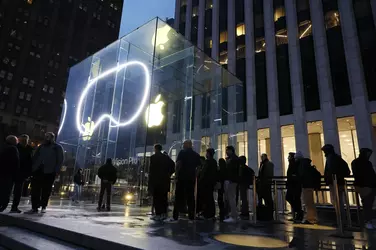
People stand in line to purchase the Apple Vision Pro headset at the Fifth Avenue Apple store on February 02, 2024 in New York City.
Still, tech giants investing in the development of mixed reality headsets face a daunting challenge that extends beyond the entertainment available. They need to convince consumers that the devices are both worth paying for and putting on their faces.
That’s partially why Apple emphasized the Vision Pro as a spatial computing tool, focusing on work and productivity rather than just 2-D and 3-D entertainment capabilities.
Still, even a decade later, experts can’t seem to agree on exactly when VR will have its breakout moment. Nepveu said it could happen any day. Raphaël expected one or two years. Davis suggested three to seven. Seiden said five to 10.
Raphaël, however, believes 2-D content may soon feel as dated as pre-Technicolor entertainment.
“Content, the way it is consumed today, is going to be much like we think of black and white movies, where, if a film isn’t immersive, it doesn’t lose its value, but it becomes something of another era,” Raphaël said.

